Specific Of Plastic Bottle Cap Injection Mould
——
| Product Name | Water Bottle Cap Injection Mold |
| Shaping Molding | Plastic Injection Molding |
| Mould Material | NAK80, S136, H13, 718H, P20, etc. |
| Mould Cavity | Single/Multi Cavities |
| Mould Base | MISUMI,LKM,DME,HASCO,Self-Made.etc. |
| Mold Runner | Hot/Cold Runner |
| Mold Life | 30-50K Shot |
| Mould Surface Treatment | Sandblast(Polishing/Texturing Can Be Customized) |
| Plastic Bottle Cap Material | PP,PC,PE,ABS,PVC,PET,AS.etc. |
Description Of Plastic Bottle Cap Injection Mould
——
KRMOLD Plastic Bottle Cap Injection Mould is a kind of special injection mold for producing plastic bottle caps, using the injection Molding Process, by injecting the molten plastic into the mold cavity, after cooling and curing to form the final shape of the cap.KRMOLD Bottle Cap Injection Mould is widely used in the food, beverage, daily chemical, pharmaceutical and chemical industries. KRMOLD Bottle Cap Mould is widely used in the design and manufacture of plastic bottle cap products in the food, beverage, cosmetic, pharmaceutical and chemical industries, etc. We have successfully helped our customers to design high-precision injection molds to improve the quality of injection molded plastic bottle caps and to achieve mass production to improve production efficiency and reduce production costs.
KRMOLD has a professional mold design team and a complete mold manufacturing workshop to help customers solve the injection molding needs, provide the products you need to produce to us, we will provide you with fully customized design solutions, for example, just send us the photos of the plastic bottle cap products and needs, we immediately prepare the right production plan for you. Welcome to contact us.
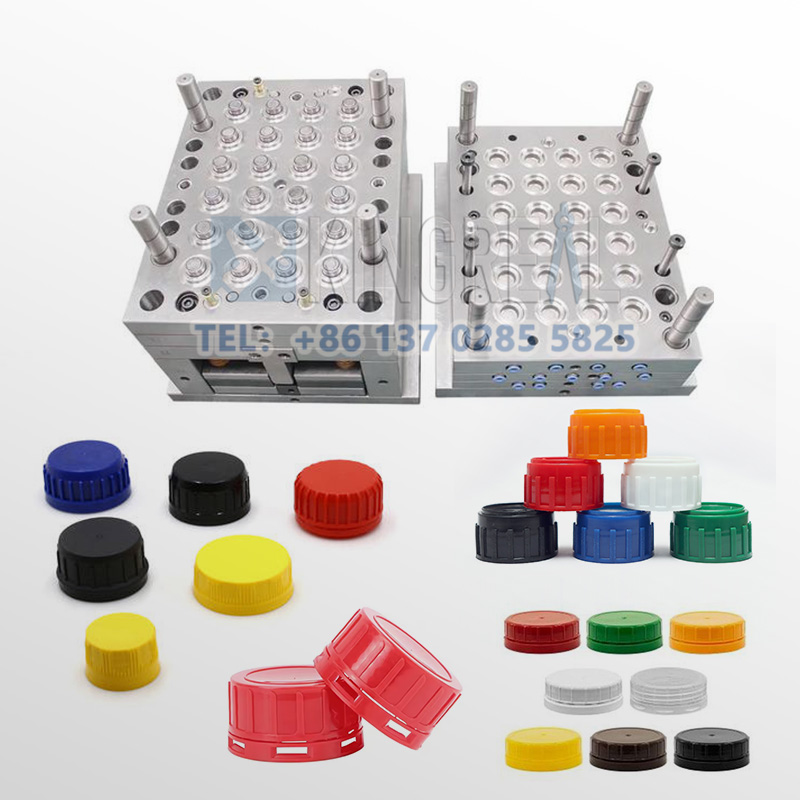
Advantage Of Bottle Cap Mould
——
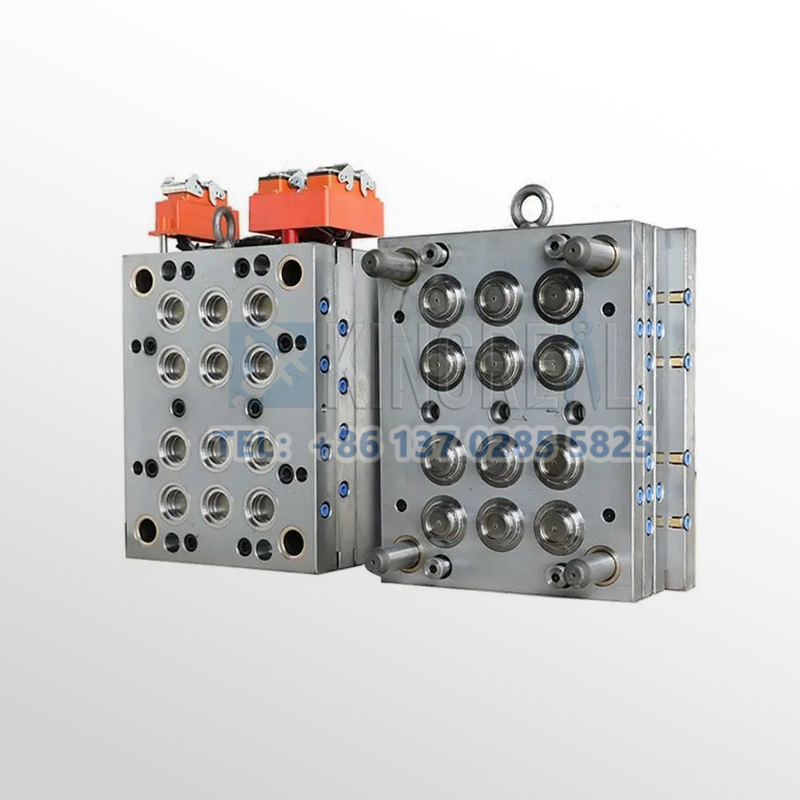
Generally speaking plastic bottle cap products need to have good sealing, otherwise it will lead to liquid leakage or contamination, so the processing accuracy of plastic bottle cap injection molds is usually ±0.01mm or even higher to ensure the consistency of the cap size.At the same time, the threaded structure of plastic bottle caps, grommets, anti-theft rings and other details must be accurately processed to ensure that the caps can be firmly tightened and can be opened smoothly.
KRMOLD adopts high-precision CNC machining equipment for precision machining of plastic bottle cap injection molds. Adopting EDM (Electric Discharge Machining), mirror polishing and other processes to ensure a high degree of mold cavity finish and reduce the defects of plastic bottle cap products. In addition, Mold Flow Analysis is conducted to optimize the injection process and avoid defects such as air bubbles and shrink marks.
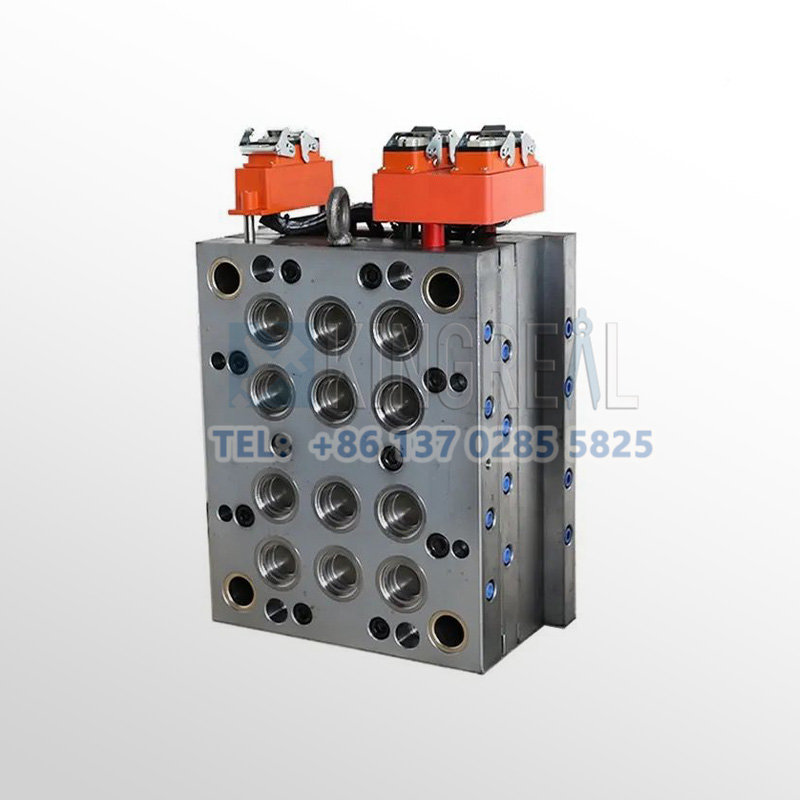
KRMOLD plastic bottle cap injection mold design multi-cavity structure to achieve a multi-cavity mold can produce multiple caps in one injection cycle, the common number of cavities include 8 cavities, 16 cavities, 32 cavities, 48 cavities, 96 cavities, 128 cavities and so on.
In the design of the injection mold using a uniform arrangement of the mold cavity design, to ensure that each cavity force uniformity, to prevent product deformation, counting the balance of the gate system, to ensure that the plastic melt uniformly filled with each cavity, to improve the quality of the bottle cap.
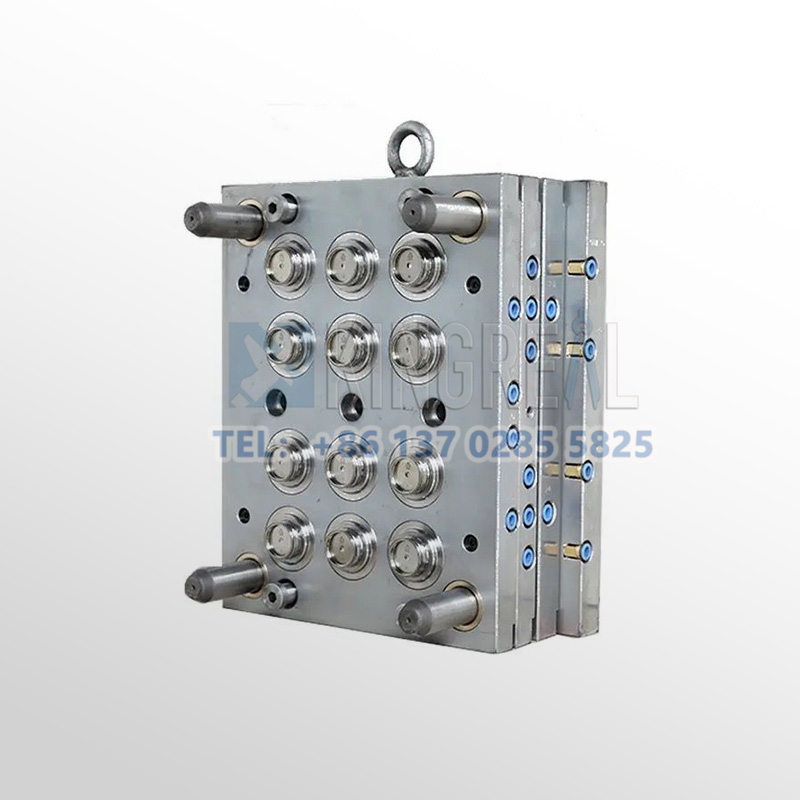
Plastic bottle cap injection molds use high-quality mold steel such as S136, H13 and P20 to improve the wear resistance of the mold and reduce maintenance costs. The life of injection molds can reach 3~5 million molds, which reduces the replacement cost.
Plastic bottle cap injection mold adopts nitriding treatment and chrome plating treatment to enhance wear resistance and corrosion resistance, and is designed with replaceable mold core, so that when the mold is damaged, it can be replaced with partial components without the need to replace the whole set of mold.
Common Raw Materials for Plastic Bottle Caps
——
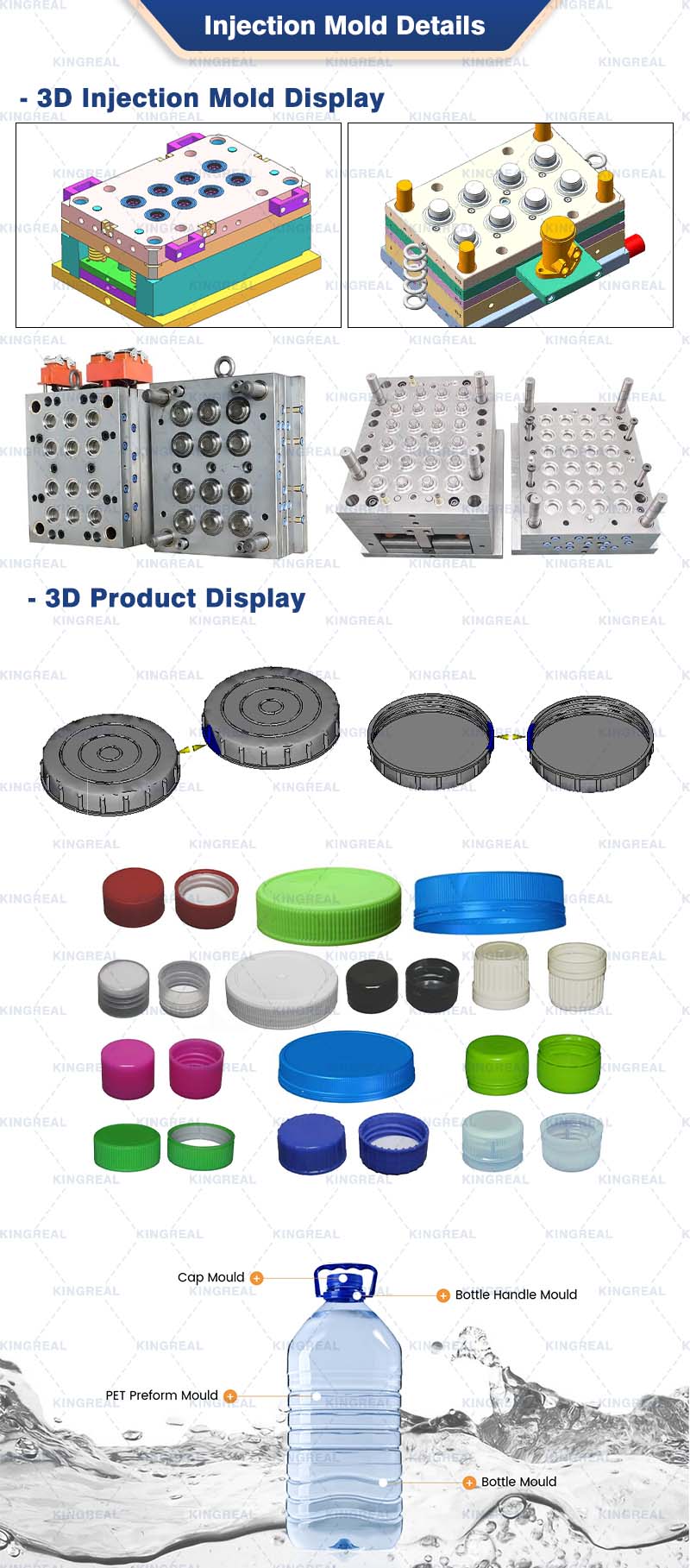
1. Plastic bottle caps are made of polypropylene (PP, Polypropylene), which has good toughness and will not break even if opened and closed repeatedly. High temperature resistance (up to 100 ~ 120 ℃), can be used for hot filling products (such as soy milk, fruit juice), good toughness, even if repeatedly opened and closed, the cap will not break. Commonly used in mineral water bottle caps, beverage bottle caps and cosmetic bottle caps, etc.
2. Plastic bottle cap products using high-density polyethylene (HDPE, High-Density Polyethylene) as raw materials, with strong impact resistance, high flexibility and chemical resistance and other characteristics, commonly used in carbonated beverage bottle caps, edible oil bottle caps and disinfectant bottle caps.
3. the use of polyethylene terephthalate (PET, Polyethylene Terephthalate) raw materials for the production of plastic bottle caps, has a high degree of transparency, high impact resistance and high recycling rate, commonly used in transparent water bottles and cosmetic bottle caps
"KRMOLD designs and manufactures plastic bottle cap injection molds to meet the needs of different raw materials, with multi-material compatibility features, to solve the customer's production needs."
What injection mold manufacturing services does KRMOLD offer?
——
1.One-stop full-process service
We provide full-process service from integrating requirements, mold design and manufacturing to delivery and after-sales service.
The technical team is deeply involved in the customer's product design stage, optimizing the mold structure and designing the mold drawings through the mold flow analysis software (such as Autodesk Moldflow, UGNX). Equipped with imported CNC, Shadick wire cutting machine, mirror discharge equipment and other precision processing equipment to achieve ±0.02mm precision;
We have a large-scale intelligent workshop to support secondary processing such as silk-screen printing, welding, spraying, etc. We strictly implement the quality system of ISO13485 and IATF16949; meanwhile, we provide free transportation, regular mold maintenance and one-year warranty service.
2.Complete quality control system
There is a full chain production workshop, using Makino five-axis machining centers, Haitian injection molding machines and other well-known equipment at home and abroad to avoid delays in outgoing processing. Through the CMM coordinate measuring machine, three-dimensional inspection instrument full inspection of key dimensions, the implementation of PDCA cycle quality management. Meanwhile, we provide complete quality inspection report of injection molds.
3.Accurate delivery control to guarantee the project schedule
Through digital management, production progress monitoring from the beginning of the order, for different orders and delivery date for data monitoring, once there are factors that may be delayed, immediately arrange to speed up the production schedule, to ensure that the customer in the delivery period to complete the manufacturing of plastic injection molds.
Specify the type of plastic (e.g. PP, ABS) and post-processing requirements (e.g. spraying, silk-screen printing), and provide 2D or 3D plastic part drawings should be provided. At the same time, provide the production volume, appearance requirements, tolerance standards, etc.
Generally speaking, our engineers will start to prepare the quotation immediately after the customer provides the complete production requirements. Usually it takes about 1-3 days.
The lead time for regular injection molds is usually 30-60 days, and may be longer for complex molds. For example, the typical lead time for liquid silicone molds is around 60 days, covering design, manufacturing, mold testing, etc.
High-precision processing technology: High-precision equipment such as CNC machining centers (CNC) and electric discharge machining (EDM) are used to optimize the design process in combination with CAD/CAM software. Quality control: Inspection of key dimensions of the mold by Coordinate Measuring Machine (CMM) and verification of multiple sample batches during the trial molding stage. Material Selection: Use die steel with high wear resistance (e.g. H13, S136) and surface treatment (e.g. nitriding, chrome plating) for die nuts to extend the life.
After every 50,000 molds, check the guide pillar, ejector pin and other wear parts, and clean up the residual plastic and rust on the mold surface. Use high temperature grease for sliding parts (e.g. tilt top, slider) to reduce friction loss. Ensure that the water circuit is smooth and the temperature difference is ≤5℃ to avoid cracking of the mold due to thermal stress.
Mould cost of materials accounted for about 30-40% (such as 1 ton of P20 steel price of about 20,000 yuan), processing costs accounted for more than 50% (CNC labor hourly rate of about 80-150 yuan / hour). Small batch production can choose aluminum mold or simplify the structural design; more than 100,000 pieces is recommended to use carbide inserts to enhance life!
Mould injection products need to fully meet the design requirements (such as size, appearance), and can be continuous and stable production. Mold marking, inspection reports (such as material hardness test) and engineering drawings should be complete.
Mould steel (such as S136H, NAK80 and other imported materials cost more) and the type of mold embryo (aluminum mold short-term cost is low but short life) directly affect the cost, the use of CAD/CAE/CAM design technology, hot runner system, etc. will increase the upfront investment, but can enhance the long-term benefits (such as reducing the sprues, increase production capacity).